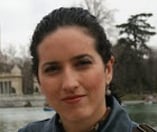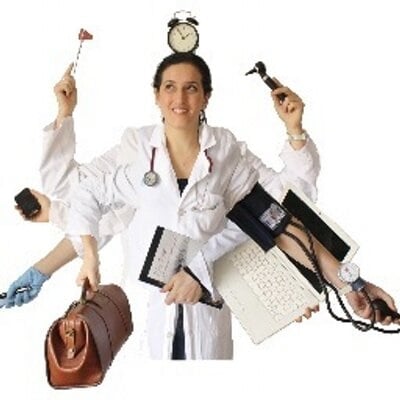GOMEZ BRAVO, Dr Raquel (English/español)
Spain/ Luxembourg - family doctor
 español
Raquel Gómez Bravo is a family physician from Spain, a member of the International Section of SemFYC (Spanish Scientific Society of Family and Community Medicine) and member of the Executive of the WONCA Special Interest Group on Family Violence (SIGFV). She was very active in the executive of the Vasco da Gama Movement for young doctors as well as EURIPA until last October’s conference in Istanbul where she stepped down from both positions.
español
Raquel Gómez Bravo is a family physician from Spain, a member of the International Section of SemFYC (Spanish Scientific Society of Family and Community Medicine) and member of the Executive of the WONCA Special Interest Group on Family Violence (SIGFV). She was very active in the executive of the Vasco da Gama Movement for young doctors as well as EURIPA until last October’s conference in Istanbul where she stepped down from both positions.
What work do you do currently?
I am working in Luxembourg as a freelance Quality and Assistant Editor involved in a very exciting project managed by the BMJ to translate their resource BMJ Best Practice into Spanish as a fantastic point of care tool for health care professionals.
At the same time I am part of the team of the WHO collaborative centre of the Andalusian School of Public Health in integrated health services based on primary health care.
Meanwhile I am preparing my project on family violence to apply for a PhD position. I am learning French and German in order to be able to work as a GP in Luxembourg and I am staying involved in the International Section of semFYC, where I am carrying out several projects linked to WONCA networks.
What other interesting activities that you have been involved in and in particular your activities in WONCA?
I am a dreamer, I love to think that anything is possible. And for sure it is, if you can build a team that believe in the idea and then you fight together for it.
Enthusiasm and passion can move the world. It doesn’t matter if it is a local project, the important thing is to help make the change for better health care.

I am very multifaceted and I like to diversify myself in different projects. (
Photo: Raquel "Shiva") I love networking: this energy of the team, craving to learn from each other, knowing more colleagues with the same interest but different points of view that enrich any proposal. So, I have been taking part in several things at the same time, jumping from making audits in hospitals, to teaching leadership, or to work as a emergency doctor on an island, like I did last year in Ibiza.
During my specialisation as a family doctor, I had the good fortune to be very involved in SemFYC at a national and international level. I discovered WONCA at the very beginning of it, in 2006, but I wish I could have known more during my university studies, where primary care at that time was completely missing.
As I had the opportunity, I was very involved with VDGM, the European junior doctors’ movement, leading the Beyond Europe group (BE). I worked very closely with EURIPA (the rural group), where I met lots of incredible rural doctors including the impressive John Wynn-Jones. I discovered the amazing WONCA Working Party on Women and Family Medicine (WWPWFM. It was a fantastic experience to be part of the executive of EURIPA and VDGM and fight for new ideas, innovate, promote the exchanges (we create the rural exchanges and the
Carosino Prize to keep the memory of Claudio Carosino alive), engage more colleagues and provide them the forum and the necessary support to develop projects.
Being part of VdGM changed my life!
The pinnacle of achievements was the creation of the 1st Forum of the VdGM in Barcelona, in 2012, thanks to the passion and perseverance of the VDGM past president and my great friend Harris Lygidakis, the support of the incredible Spanish team, semFYC, Colegio Oficial de Médicos de Barcelona (COMB) and WONCA Europe. It was an event created to provide continuity and meet more regularly, building a stronger network linked to the senior groups of WONCA, innovating in the structure of the meeting, where students, patients and any type of healthcare professional are welcome to brainstorm and work together, with very low registration fees (no more than 100 euros) to make possible that anyone could. The 3rd forum will take place in Jerusalem this year.
In 2012 I moved from Spain to Luxembourg because of love. That September, I got a bursary to attend the meeting of the WWPWFM, in Canberra, Australia, which was one of the most incredible experiences that I had.On my return I moved together with the great love of my life, Martin,
“si tu me dices ven, lo dejo todo” (if you tell me to come I leave everything).
During these last three years but one of the most exciting things I have been involved in has been the creation of the
WONCA SIG on Family Violence. I got involved in Australia at the WWPWFM meeting and thanks to the astonishing women of WONCA, I came back to Europe with the idea to start working in VDGM with it.
Learning from these great professionals my life was a new influence to change direction, focusing my interest in family violence, participating as well in a Leonardo Project “A health sector toolkit for implementing learning from violence against women trainings”, thanks to Carmen Fernández, one of my beloved mentors.
Apart from this, I have been also active in the IMAGE group of VDGM, where we have been exploring the use of Social Media and trying to implement during the conferences.
What are your interests as a family physician and also outside work?
As a family physician I am passionate about everything, medicine is just amazing as a profession up to the point that it is a way of life. I have been involved in different fields but there are many more that I would love to dive deeper into, but being a GP is the most complex specialization so I would say that my interest is exactly this, family medicine. And in it, communication, all the possible ways of communication, because without it, the art of medicine is not possible.
Outside my professional life, I love literature, writing has been always my passion, culture, art, music, travelling, sports, nature. Family and friends hold a special place - the doors of my house are always open and there is a welcome always here or there, wherever I am.
What is it like to be a family doctor in Spain?
Being a Family Doctor in Spain is not easy for the junior doctors in my opinion, with a situation of crisis, uncertainty and precarious working conditions. The training could be excellent and the specialist GPs that are finishing are well qualified to work as GPs but the working conditions are not desirable. You can not have the continuity of your population, which is one of the basic principles of primary care, or your contract is three months maximum. Maybe I am very critical, because yes, it is possible to be lucky and find a stable place but this is happening in few cases and for sure, there is an inequality between the different communities, but it is terribly sad to have a potentially great primary care system and not take care of it.
Theoretically, investing in it will reduce mortality because like I heard from Iona Heath, who said once “the role of the doctors is to protect patients against medicine” and to do so and avoid iatrogenic disease, that is the third commonest cause of death, it is necessary that GPs can take longitudinal care of their population. It is necessary to make a deep reform of the system, placing primary care in the centre of the health system and changing the existing hospital centric nature. Spain has great doctors and excellent Primary Care (like the book
Building in a changing Europe reports) but I am afraid their full potential is underused and part of this intellectual capital is not being taken care of. I like to be optimistic and I hope that one day we can wake up and fight harder for our wishes and raise awareness among the population to rebuild the healthcare system together and offer the care that we dream about.
To make contact with Raquel, email:
[email protected]